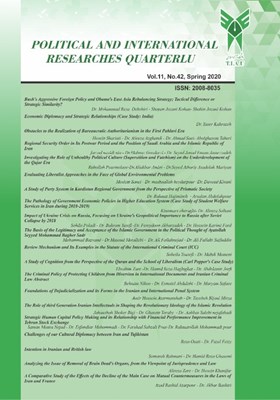Bush's Aggressive Foreign Policy and Obama's East Asia Rebalancing Strategy; Tactical Difference or Strategic Similarity
Subject Areas : Political and International Researches QuarterlyMohammad Reza Dehshiri 1 * , Shayan Jozani Kohan 2 , Shahin Jozani Kohan 3
1 -
2 -
3 -
Keywords: Offensive realism, Obama, Copenhagen School, Bush, East Asia,
Abstract :
Mohammad Reza Dehshiri[1] Shayan Jozani Kohan[2] Shahin Jozani Kohan[3] Abstract: When Obama came to power, Bush's multilateralism and aggressive foreign policy was converted to a "rebalancing" policy, in which US interests were considered more than any other issue. Obama's East Asia rebalancing policy was pursued with the aim of redefining interests, threats and political, economic and military strategies. The question of the current paper is how were Bush's "aggressive foreign policy" and "Obama's" rebalancing policy pursued to promote US interests in East Asia? For answering this question, the authors believe that Bush's foreign policy has been pursued by adopting a multilateralism approach focused on resolving the Korean Peninsula’s crisis with the aim of creating consensus in East Asia and cooperation with China. While the policy of rebalancing with a multilateralism approach has been pursued and focusing on the prevention of China's economic and military growth with the goal of consensus among the countries aligned with US policies in East Asia. The research method in this paper is analytical and descriptive through library resources. Using the theory of offensive realism and the Copenhagen School, this paper seeks to explain and analyze the policies of Bush and Obama in East Asia, to examine the differences, commonalities and approaches of each, and the orientation of US foreign policy in the East Asian region [1]-Associate Professor and Faculty Member, Department of Political Science, Faculty of International Relations of Ministry of Foreign Affairs, Tehran, Iran: Corresponding Author [2]-MA in Regional Studies (East Asia), Faculty of International Relations of Ministry of Foreign Affairs, Tehran, Iran [3]-MA in Regional Studies (West Asia (Middle East) and North Africa), Faculty of International Relations of Ministry of Foreign Affairs, and Guest Researcher of the Middle East Strategic Studies Research Institute, Center for Scientific Research and Strategic Studies of the Middle East, Ministry of Foreign Affairs,Tehran, Iran
_||_

